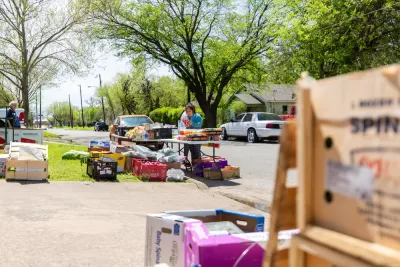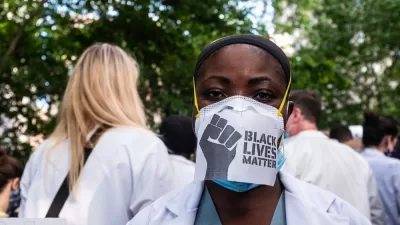What would a crisis response that finally overcomes the history of slavery and structural racism in the United States look like?

The effects of the coronavirus have not been equal across race and class lines—in public health outcomes as well as economic outcomes. Perhaps more than ever before, the consequences of structural racism are on full display every single day in the United States, as more people of color lose their jobs and their lives at a higher rate than the general population in every corner of the country.
Stephen F. Gray, assistant professor of urban design at the Harvard Graduate School of Design and a founder of the Boston-based design firm Grayscale Collaborative, writes an opinion piece for Next City on how planners, designers, and policymakers can use those lessons to fight for intentionally antiracist policy agendas.
History hasn't been enough to divert from the status quo, according to Gray.
Though the COVID crisis has put the lethal legacy of slavery on full display, the CDC only recently started collecting and disaggregating data by race. Their slowness to act decisively is either from political embarrassment, willful ignorance, or ambivalence to the immediate and life-saving significance of this information, and so when the US President and many in his political party push to reopen the economy prematurely, we shouldn’t be surprised. Once again, economic concerns in this country are taking priority over public health concerns and human life, as they often do when black and brown people are involved.
So now, more than ever, is the time to take action, according to Gray, "to ensure that a post-COVID-19 recovery benefits both sides of the color-line and that we as a nation truly begin to address the structural roots of racial inequality."
Gray has some specific recommendations for achieving that kind of ambitious change. Ideas include, with a lot more detail provided in the source article, specific recommendations for housing policy, economic development, and the public domain.
FULL STORY: COVID-19 Puts Structural Racism On Full Display — Will We Finally Do Something to Correct It?

Planetizen Federal Action Tracker
A weekly monitor of how Trump’s orders and actions are impacting planners and planning in America.

Maui's Vacation Rental Debate Turns Ugly
Verbal attacks, misinformation campaigns and fistfights plague a high-stakes debate to convert thousands of vacation rentals into long-term housing.

San Francisco Suspends Traffic Calming Amidst Record Deaths
Citing “a challenging fiscal landscape,” the city will cease the program on the heels of 42 traffic deaths, including 24 pedestrians.

Amtrak Rolls Out New Orleans to Alabama “Mardi Gras” Train
The new service will operate morning and evening departures between Mobile and New Orleans.

The Subversive Car-Free Guide to Trump's Great American Road Trip
Car-free ways to access Chicagoland’s best tourist attractions.

San Antonio and Austin are Fusing Into one Massive Megaregion
The region spanning the two central Texas cities is growing fast, posing challenges for local infrastructure and water supplies.
Urban Design for Planners 1: Software Tools
This six-course series explores essential urban design concepts using open source software and equips planners with the tools they need to participate fully in the urban design process.
Planning for Universal Design
Learn the tools for implementing Universal Design in planning regulations.
Heyer Gruel & Associates PA
JM Goldson LLC
Custer County Colorado
City of Camden Redevelopment Agency
City of Astoria
Transportation Research & Education Center (TREC) at Portland State University
Jefferson Parish Government
Camden Redevelopment Agency
City of Claremont





























